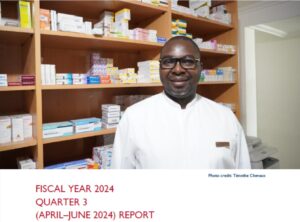Improving Pharmaceutical Financing
In many LMICs, pharmaceuticals are primarily financed through direct out-of-pocket payments by individuals and households, but this source of financing is both inefficient and inequitable. At the same time, between 20% and 40% of health expenditures in LMICs are estimated to be wasted, and in the pharmaceutical system this is seen in the form of expiries; poor financial management; misaligned provider incentives; inefficient medicine selection; and outdated procurement, pricing, reimbursement, and distribution practices. As countries expand essential health coverage within resource-constrained environments, sustainable and equitable access to effective, safe, quality-assured, and affordable treatments, diagnoses, and services requires countries to have a well-functioning national pharmaceutical financing system with the capacity to mobilize, allocate, and use resources in a timely manner.
USAID supports strategies to improve pharmaceutical-sector financing, including resource mobilization, allocation, and use. The 2017 Lancet commission report on essential medicines and universal health coverage (UHC) estimated that between USD 77.4 and 151.9 billion (or USD 13 to 25 per capita) is required to finance a basic package of 201 essential medicines (378 dosage forms) in all LMICs. To reduce out-of-pocket expenditures and adequately fund essential medicine packages and the country systems needed to manage them, countries need to use evidence to generate political will to allocate more resources to health, enhance financial management and expenditure analysis so resources can be mobilized efficiently, and undertake reforms to avoid waste and improve disease management and system outcomes within existing resources.
Download Download French